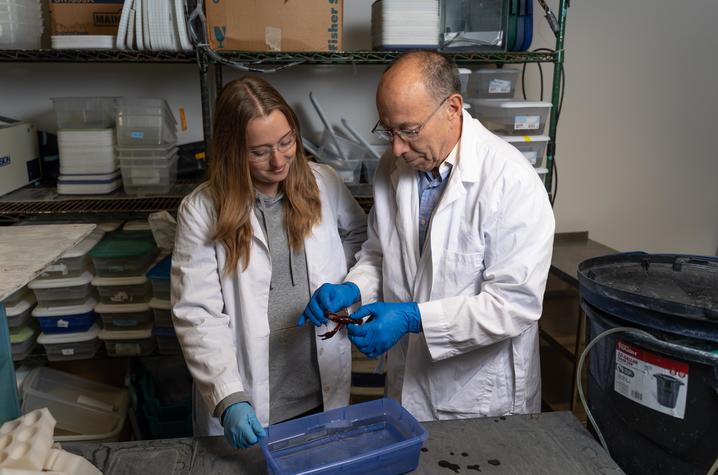Growing up in Lexington, Kentucky, Kaitlyn Brock attended Frederick Douglass High School. Research opportunities were limited, as the school opened in 2017. Instead, Brock's earliest exposure to research came from her stepmom, who was a student at the University of Kentucky participating in biology research at the time. Now Brock, and one of her four younger siblings, both attend the University of Kentucky.
In 2022, the University of Kentucky was named a Beckman Scholars Program Awardee. As one of just 14 institutions to receive the prestigious award, they were given funding support for six scholar-mentor pairs over a three-year period. The Beckman Scholars Program provides 15-month mentored research experiences for exceptional undergraduate students in chemistry, biological sciences and interdisciplinary combinations thereof. Brock was named to the 2023-24 cohort.
"I first learned of the Beckman Scholars Program through my experience as an Undergraduate Research Ambassador," said the senior neuroscience and psychology major in the College of Arts and Sciences and the Lewis Honors College. "The Beckman Scholars at the time, Elaf Ghoneim and Parker Sornberger, shared their outstanding experience in the program with us and I was immediately interested in applying. I was very interested in the leadership training and network-building opportunities offered by the program as well as the opportunity to learn about research from other universities."
Brock's research, which will span two summer terms and a full academic year, involves examining the effects of bacterial endotoxin, lipopolysaccharides (LPS), on synaptic transmission at the skeletal muscle of test flies and test crayfish. Recently she was led to investigate the ability of the compound doxapram to inhibit the effects of LPS, finding that doxapram seemed to block the ability of LPS to increase synaptic activity.
"The focus of this research, bacterial endotoxin, can cause sepsis in humans and mammals by triggering an immune system response," Brock explained. "The direct action of LPS on cells is currently unknown, nor is there a known pharmacological blocker of LPS. It is beneficial to examine multiple preparations, such as the fly and crayfish, to compare and contrast the action of LPS on different biological systems."
Brock's hope is that the outputs of her Beckman-funded research in the Cooper lab might drive improvements in the pharmacological treatments used for sepsis caused by LPS. She has other expectations, too, for what the program experience might bring, having already realized benefits from the opportunity to participate in long-term mentored research.

"Dr. Robin Cooper has allowed me to advance my laboratory technique as well as my independence in developing and executing projects," she said. "I have learned the ins and outs of literature searching, publication and peer review. I feel more confident in my ability to share my research with a general audience."
The plan is to continue the research project through to graduation, working with the test crayfish and test flies and possibly exploring the effects of other compounds on them, and using the program experience as a foundation for the next step: Graduate school.
"After I finish my undergraduate experience," Brock said, "I plan to apply to a neuroscience Ph.D. program and further my research education. I am honored to be a part of the Beckman Scholar's Program!"






